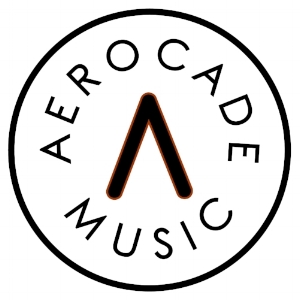Sunday, March 23, 2025
7PM
Tickets: $25 general/$20 for members
Center for New Music
55 Taylor St. San Francisco, CA
BUY Tickets
Center for New Music Event page
Facebook Event page
2025 is the 10th year of Aerocade Music and the first year as a non-profit record label. Celebrate with us at our Birthday Concert featuring performances by Aerocade Artists Isaac Io Schankler, Nick Norton, Elizabeth Robinson, Alchymie & Gregg Skloff, and Chelsea Hollow & Taylor Chan. Arrive on time for a pre-concert reception catered by local musician and vegan chef, Philip Gelb!
Nick Norton will provide a live spatial mix of his new piece for four harps, recorded by Elizabeth Huston. Soprano Chelsea Hollow and pianist Taylor Chan will perform selections from "Cycles of Resistance," a cathartic and resilient journey through international resistance movements from the last 120 years. Flutist Elizabeth Robinson will perform "Death Whistle" for solo piccolo by Nicole Chamberlain. Isaac Io Schankler will premiere some nascent works for accordion + electronics. Alchymie & Gregg Skloff will present "TRITION: Echoes from the Ice Moon," an improvisational performance weaving deep drone, ambient textures, and ethereal soundscapes to evoke the mysterious beauty of Neptune's largest moon. Through shifting sonic currents, the keyboard and contrabass duo explores Triton's icy geysers, retrograde orbit, and haunting solitude in the vastness of space.
Performers:
ALCHYMIE
Alchymie /aka Jennifer Theuer Růžička/, was created in 2013. Through electronic and acoustic instruments, sound loops, improvisation and field recordings Alchymie spans ambient soundscapes, electronica, new age and drone; painting textural atmospheres of sound for recordings or performances with a conceptual focus. Alchymie explores sound as a way to provide multidimensional well-being, create community, and open discussions about the power of sound in our world today.
Jennifer has been composing and performing professionally for over 30 years. Classically trained in piano performance with an eclectic background in R&B, funk, fusion, rock, jazz, pop, new age, and experimental. Diving into esoteric electronica as a member of the Beta Lyra project, exploring the cosmos by collaborating with experimental drone artist Gregg Skloff, and performing & recording internationally— having toured with Alexander O’Neal, former Paisley Park artist David “T.C.” Ellis, Mallia “The Queen of Funk” Franklin from Parliament-Funkadelic and Parlet; and performances with Czech legends Pavel Bobek, and Karel Šůcha and Laura A Její Tygří(Laura and Her Tigers). Collaborations with Fred Johnson- acclaimed jazz vocalist/author/arts educator and artist-in-residence at the Straz Center for the Performing Arts in Tampa, Fl; The Dalí Museum in St. Petersburg, Fl for the exhibition Dalí’s Floral Fantasies.
She has taught piano throughout her career both in the USA and Czech Republic to young and old, helping them to discover the joy within music and in learning an instrument.
Jennifer continues to follow Alchymie in music, searching for the beauty that is transformation.
GREGG SKLOFF
Noticing contrabassist Gregg Skloff [he/his] carrying his instrument on a city sidewalk, a passing stranger once asked him, “Classical or jazz?”
Gregg’s reply: “All of the above AND BEYOND!”
This remark, while glib, is quite apt; as his album The Glacial Enclosure (Eiderdown Records, 2016) – along with his other work – can demonstrate, Gregg Skloff manages to combine and transcend many lineages and languages of composition and improvisation.
Gregg’s scope has encompassed various forms and hybrids of rock, folk, jazz, chamber music, noise, sound-object installation, and non-idiomatic improvisation. His solo efforts have largely inhabited the realm of minimal electro-acoustic ambient drone, heard to profound effect on albums such as This Time The Ride Belongs To Us (2014), Mamua Baso Suite (2019), and River Cat Cenotaph (2021).
Based in the Pacific Northwest since 1997, Gregg Skloff has played in ensembles led by Bhob Rainey, John Gruntfest, Urs Leimgruber, Moe! Staiano, Matana Roberts, and Gino Robair, among others. He has been a member of The Naked Future (also featuring bass clarinetist Arrington de Dionyso, pianist Thollem McDonas, and drummer John Niekrasz), whose album Gigantomachia was released by ESP-Disk’ in 2009, and more recently of Humming Amps Trio (led by Kevin Doria of GROWING). From 2011 to 2019, Gregg hosted the “And Otherness” program on Coast Community Radio, where his affinity for innovative, ethereal, and/or outré sounds led writer Robert Ham to describe him as “one of the Oregon coast’s finest supporters of experimental music.”
CHELSEA HOLLOW
Dazzling audiences with her easy coloratura, storytelling, and passionate performances, Chelsea Hollow loves finding new ways of connecting her art to the world around her. She “shows how it’s done” with her “fun and effortless” performances curated to welcome audiences into the intimacy of recital seamlessly weaving together music from all eras and genres. Recent operatic performances include Birds and Balls with Opera Parallèle, Dolores with West Edge Opera, and Albert Herring with Pocket Opera. Known for her “soaring high range” and “stage panache,” favorite traditional roles include Die Königin der Nacht (Die Zauberflöte/Mozart), Zerbinetta (Ariadne auf Naxos/Strauss), Blonde (Die Entführung aus dem Serail/Mozart), Olympia (Les Contes d’Hoffmann/Offenbach), Lakmé (Lakmé/Delibes), and Marie (La Fille du régiment/Donizetti). Concert appearances include Concerto for Two Orchestras (Gubaidulina) with the Berkeley Symphony, Carmina Burana (Orff) and Beethoven’s 9th Symphony with the Golden Gate Symphony Orchestra and Judas Maccabaeus by Handel with the San Francisco City Chorus.
Chelsea Hollow “has rewritten the book on the potential of musical activism” creating art that invites her audiences to think collectively and gain perspective. In 2023, she released her debut album, Cycles of Resistance, including 22 commissions in 8 languages chronicling international stories of human resilience. In recognition of this project, Chelsea presented on a panel hosted by the United Nations’ Office of Human Rights to discuss Art and Activism. Hollow cherishes her mission as an artist to build capacity for empathy, harness a venue for community healing, and amplify marginalized voices.
In addition to her solo work, Hollow createdAllowed to be Loud (2021) for the students of San Francisco Ruth Asawa School of the Arts (RASOTA) Vocal Department, commissioning song repertoire for young voices using texts by Bay Area high school students, The Kids and Art Foundation, and other anonymous community members. Highlights from the 21 commissioned songs include, “Being a Student in 2020” (Emily Shisko), “The Future Holds Water in a Wicker Basket” (Joel Chapman), and “I am Growing” (JooWan Kim). For more information on Chelsea’s work, please visit chelseahollow.com.
TAYLOR CHAN
Taylor Chan learned the art of collaboration—in music and in life—while completing her M.M. in Collaborative Piano at the San Francisco Conservatory of Music. There, she is currently a staff accompanist and coach to students in Voice / Opera Studies, and has the pleasure of regularly performing alongside them in musical theater and opera productions. She has also held various administrative positions at SFCM in production-adjacent roles, enjoying projects that involve technical writing, data management, creating efficient systems, and identifying ways to optimize collaborative workflow.
Most recently, her relationship with music has expanded in the direction of pedagogy, as she actualizes her general life-calling of knowledge transmission. She would like to pass on her methodologies of self-led skill acquisition to younger artists’, in order to enable them to transcend the limitations of their personal challenges, to raise their ceilings of self-expression and self-actualization.
In addition, she enjoys analyzing piano technique and articulating principles of its physics and physiology, approaching it as a simultaneously scientific and spiritual study. She wishes to change the culture in which chronic repetitive-stress injuries are a given, yet rarely openly discussed.
Her favorite past performances include: the full-length version premiere of Mortal Lessons (2018), a medical oratorio by Ryan Brown (b. 1979); Meredith Monk’s Ellis Island, with pianist Kate Campbell, in a side-by-side concert between SFCM and San Francisco Contemporary Music Players (2018); Steve Reich’s Music for 18 Musicians at the 2019 Hot Air Music Festival, and Philip Glass’ La Belle et la Bête with Opera Parallelè.
Outside of music, her interests include interpersonal psychology, neuroscience, philosophy, writing, design, visual art, and cats.
NICK NORTON
Nick Norton makes things out of sound. His debut album Music For Sunsets caused electronica.org.uk to proclaim him a composer and sound artist to be reckoned with, and Foxy Digitalis called the album an expensive sonic treat.
Born in Los Angeles, Nick grew up going to shows in the Ventura County punk scene, playing sax in his school’s jazz band, and spending summers on Catalina Island. He went to college at UC San Diego, where he discovered minimalism, noise rock, and avant garde classical music, and graduate school for composition at King’s College, London, and UC Santa Barbara. While earning his PhD Nick assisted electronic music pioneers Clarence Barlow and Curtis Roads with their work and got hooked on using audio technology to make art. During this time he founded and ran the experimental concert series Equal Sound, completing his doctorate with a dissertation titled “Concert Production As Composition.”
After a couple years as an adjunct professor Nick bailed on academia to pay the rent. While picking up recording and live sound gigs to support himself he started learning the ropes of post production. He now hops back and forth between cutting music and sound for film and TV, producing and engineering albums and concerts, and making music with his friends.
Nick has lately been interested in AI tools and ethics, live spatial audio, and field recording. He is very active in his community—he serves on the Emerging Technology Committee of the Motion Picture Editors Guild, regularly produces projects in support of charitable causes, and teaches music production at Santa Monica College. Nick enjoys good company, fantastic meals, political philosophy, travel, sci-fi, nature, board games, Zen Buddhism, and dogs.
ELIZABETH ROBINSON
Flutist and educator Dr. Elizabeth Robinson is an active soloist, orchestral, and chamber performer. Known for her infectious energy and boundless enthusiasm, Dr. Robinson has shared the stage with orchestras and wind ensembles across the country. In addition to her current position as Marvin Maydew piccolo chair of the Topeka Symphony, she has performed regularly with the Colorado MahlerFest orchestra, Heartland Opera, and dozens of other groups.
Her debut album, Aviary, can be found on Aerocade Music. Described as “…worth a listen, and these performers and composers are worth watching” (Flutist Quarterly), Aviary features a collection of Robinson’s audience-friendly commissions for solo flute, piccolo, and flute quartet. Among them is Kim Osberg’s Fowl Play, a piece inspired by the coffee table book Extraordinary Chickens. The album was honored by the American Prize in the chamber music category, as well as the Ernst Bacon American Music category.
Aviary has blossomed what is now Aviary Quartet, a group of professional flutists dedicated to exploring the whimsical side of chamber music. The 2024-25 season will feature choral transcriptions by Dale Trumbore, as well as a whimsical ode to the American hippo bill, Lake Bacon, by Lisa Neher.
Robinson’s most recent project was the creation of the Chamber Winds of South Dakota, a modern-day ode to 18th and 19th century Harmoniemusik which brought musicians from around the Midwest to South Dakota for a weekend of chamber music. The Chamber Winds debut album is anticipated in early 2025.
In an effort to expand the flute repertoire, Robinson co-founded the Flute New Music Consortium (FNMC), and currently serves the organization as Vice President. Since its start in 2013, FNMC has commissioned new works from composers including Zhou Long, Carter Pann, Valerie Coleman, Samuel Zyman, and Reena Esmail.
Robinson coordinates FNMC’s annual composition competition and is proud of collaborations with several of its winning composers. In addition to organizing performances of the works commissioned by FNMC, Dr. Robinson often promotes works from the competition. For her efforts in growing FNMC, Dr. Robinson has been recognized in the National Flute Association’s Flutists’ Quarterly Magazine and by the Atlanta Flute Club Newsletter.
Dr. Robinson was appointed to the faculty at South Dakota State University in 2022.
ISAAC IO SCHANKLER
Isaac Io Schankler (they/them) is a composer, accordionist, and electronic musician interested in how technology complicates the ways we create and consume music. Their music has been described as "beautiful, algorithmic, organic, dystopian" (I Care If You Listen) and “remarkable listening” (Sequenza21). They have collaborated with a variety of musicians and ensembles, including the Ray-Kallay Duo, Friction Quartet, the SPLICE Ensemble, Autoduplicity, Nouveau Classical Project, gnarwhallaby, the Los Angeles Percussion Quartet, Lorelei Ensemble, Juventas New Music Ensemble, Nadia Shpachenko, Scott Worthington, and Meerenai Shim. Additionally, Schankler has written music for acclaimed video games like Ladykiller in a Bind and Analogue: A Hate Story.
Schankler is the artistic director of the concert series People Inside Electronics, and Associate Professor of Music at Cal Poly Pomona.























